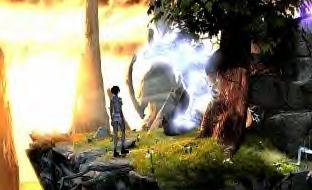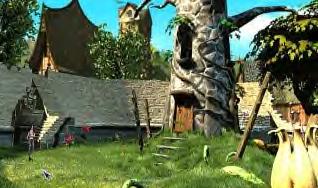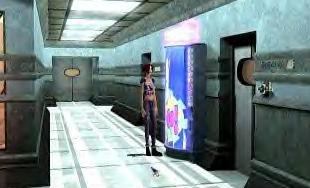|

Buying a game that you found tucked in a corner for less than ten bucks and finding an exhilirating experience is
often far more satisfying than buying a big name, overhyped game for fifty bucks and getting a merely great game. Back
during the golden age of computer gaming, the term "adventure game" didn't apply to games like The Legend of Zelda or Prince
of Persia but to point and click style games where you guided your character through the use of a mouse, where being a packrat
and picking up a wide variety of items was rewarded, and where you solved various mind-bending puzzles, no matter how weird
or out-of-place it looked if such things happened in real life. Ah, the good old days. This genre of gaming died
a slow and miserable death when such laid back conventions became too passe for mainstream gamers increasingly drunk on ever
indulgent and Hollywood-ized games. This trend is no more apparent than in Lucasarts' inexplicable lack of confidence
in continuing certain well known adventure game franchises, like Sam and Max or Full Throttle. I suppose it's just as
well. Many such point-and-click games weren't very involving or fun. But those that were the best among the genre
were also some of the most fun and engaging games. In fact, some adventure games could be described as what RPGs
would look like if you took away the stat building, random encounters, and minigames and just left the story. And
as adventure games go, it doesn't get any loftier than The Longest Journey. In fact there are very rare occasions when
a game just sucks me in and compels me to play until it's all over, and The Longest Journey is one such game.

The Longest Journey tells of the tale of April Ryan, a typical outgoing, sometimes misbehaving, eighteen-year-old studying
to become an art student in a culture city nestled in a far-future Earth stuck in a dystopian vision of malevolent corporations,
cybercops who arrest you and then try to sell you junk, and all the typical terrifying scifi imageries that made pop culture
icons like Blade Runner so identifiable. April is suffering from "artist's block", but this problem becomes insignificent
when she discovers that the nightmares she's been having are more like visions and that her destiny has been foretold by various
races dozens of times over. Flash forward through some fairly uninteresting puzzle solving just to find some hispanic
seer and some psychobabble about what is truth and you land in the real meat of the game. Through solid story-telling
and interaction with some wonderfully realized characters, you slowly uncover ever more pieces of the mystery of the world
and what your character's purpose is. You come to realize that April is what those who know more about the state of
affairs call a "Shifter", a person who can open up doorways to other dimensions. You also discover that there was once
one Earth where both magic and science coexisted but it has long since split into two, one Earth called Stark, the dreary
future world April once knew as home where Einsteinian laws of physics still hold true, and one Earth called Arcadia,
a land of unparalled beauty, magic, and fairy tale creatures but also of outdated medieval customs. Sandwiched in between
these two dimensions of science and magic is an inaccessible realm that the ancients created, where an impossibly tall tower
sits and a Buddha-like person called the Guardian lives and shifts about the flow of magic and science between these two realms
as needed. Every one thousand years, the Guardian leaves and a new Guardian arrives, and so on until the day where both
worlds are deemed worthy of reunification. But something has happened to upset this process, and chaos threatens to
tear the fabric of reality apart.

As can probably be guessed, The Longest Journey is a game steeped in lore, atmosphere, and exquisite beauty. Saturating
the game are themes of clandestine groups, both good and evil, and of four dragons with ties to everything, and of something
called The Balance, and of tracking down and piecing together the parts of the key to the Guardian's realm. And even
though this game features the year 2000's outdated computer graphics and character models, it still manages to blend realistically
animated characters with artistic and jaw-dropping 2D painted backgrounds and also wonderful orchestration to create an experience
that's nothing short of breathtaking. All this in a simple point-and-click, puzzle solving adventure? Now let's
get one thing out of the way. Without gameplay, all this story still doesn't make a game. Solving the puzzles
is how you get things done, and it is here that the game rocks, even if there was no story. The puzzles are intelligent
and challenging, requiring the manipulation of items, and sometimes even characters, and reading of texts to get the necessary
information, reward, and furthering of plot. You'll get no simplistic Myst type "click on the photograph until you figure
out the gears" puzzles. One particularly memorable puzzle involves combining unlabeled potions to make spells, using
only a worn out tome to find out the combinations and the senses of touch, smell, and hear to guess at which potion is which.
Another involves spinning rune engraved disks on an Aztec-ish version of a communications array to connect
a series of call and receive transmissions to amplify your voice and wake up a snoring giant. Brilliant. There
are some pitfalls, naturally. Some puzzles are so obtuse in the way that after being stuck for a while, you'd look up
the answer online and go "Now how in the heck was I supposed to know that?" There might be instances where you'd
inadvertantly leave a key item you thought were done with that you should've picked up to use a second time, causing
you to trek needlessly back to the location you dropped it. There might also be instances where you might know how to
solve a puzzle but it doesn't want to go anywhere because your character needs to read a certain text or be at a certain place
or talk to the right character to "unlock the knowledge".

Such nitpicks are pointless, however. Make no mistake. The story is the true star of the game. In an
age when RPGs have become increasingly reliant on tired cliches, The Longest Journey's story comes as a breath of fresh air.
The expert blending of science fiction and fantasy elements is only the tip of the iceberg. As I've mentioned above,
this game exudes lore, mysticism, and atmosphere and features brilliantly well rounded and fleshed out characters and excellent
storytelling. April starts out as a typical insecure teenager but grows in courage and strength as the game progresses.
And one of the most sensitive gaming moments I've ever seen involves April calling her estranged mother and having a tender
chat on the video phone. This is even more remarkable when you consider that this is an action you don't even have to
do to complete the game. The Longest Journey is one of those few games that connects with me emotionally and makes me
think. While your character has no health bar and doesn't die(you don't even get one of those "make a mistake and restart
the puzzle" things), The Longest Journey is one of those few games where good people perish, and I don't mean the background
cannon fodder types. It also doesn't end like you'd expect and features an ending sequence that runs emotions that
range from touching to hilarious to exciting. Unfortunately, like all good stories with such far-reaching scope, there
are questions that never get answered and moments where you might feel like the game hurried just to wrap things up and couldn't
quite tell all that it wanted to tell. And if the thought of playing what is essentially an interactive novel turns
you off and you want something with a little more connection to the physical side of the gamer, then you might want to pick
up something else. Still, you'd be hard pressed to find a game more exquisitely crafted, emotional, and thoughtful.
It's a game that more people should've experienced.
Grade: Superb
Go back to adventure games section
|

